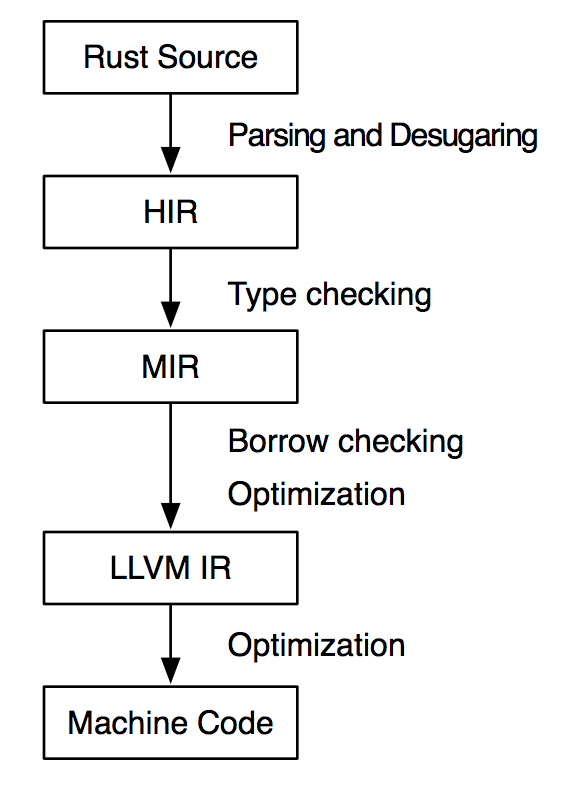RUST 101
OUTLINE
- WHY RUST
- TOOLS & ECOSYSTEM
- DEFINING FEATURES
- WHERE TO START
WHY RUST
Rust is a systems language that pursues the trifecta of:
-
speed
-
safety
-
concurrency
Speed
- No Garbage Collection
- LLVM
- Zero cost abstractions
- Minimal Runtime
Safety
- Memory safety
- Thread safety
out-of-bounds reads/writes, use-after-free, null pointer dereference and data races
Fearless Concurrency
-
Threads
-
Message Passing
-
Shared State
-
Extensible Concurrency
Beyond the trifecta
-
Cross-compilation
-
FFI Support
TOOLS & ECOSYSTEM
Compiler Toolchain
- LLVM
- Rustup
- Rustc
Rustc & LLVM
..Rust is built on LLVM and strives to resemble Clang from LLVM’s perspective, any LLVM performance improvements also help Rust.
In the long run, the richer information in Rust’s type system should also enable optimizations that are difficult or impossible for C/C++ code

- toolchain installer
- cross-compilation tool
$ rustup install nightly$ rustup default nightly$ rustup target add arm-linux-androideabi$ rustup override set nightly$ rustup showPackage Management
- Cargo
- crates.io
Rust’s Package Manager, Build tool and test runner.
$ cargo new hello_world --bincargo new
$ cd hello_world
$ tree .
.
├── Cargo.toml
└── src
└── main.rs
1 directory, 2 filesCargo.toml
[package]
name = "hello_world"
version = "0.1.0"
authors = ["Matt Gathu <mattgathu@gmail.com>"]src/main.rs
fn main() {
println!("Hello, world!");
}cargo build
$ cargo build
Compiling hello_world v0.1.0 (file:../hello_world)
$ cargo run
Fresh hello_world v0.1.0 (file:../hello_world)
Running `target/hello_world`
Hello, world!The Rust community’s crate registry.
~ 16,944 crates
IDEs Support
DEFINING FEATURES
Structs
struct Rectangle {
width: i32,
height: i32,
}
impl Rectangle {
fn new(width: i32, height: i32) -> Rectangle {
Rectangle { width, height}
}
fn area(&self) -> i32 {
self.width * self.height
}
}
fn main() {
let rect = Rectangle::new(30, 50);
println!("The area of rectangle is {}.", rect.area());
}
Traits
trait Shape {
fn area(&self) -> f32;
}impl Shape for Rectangle {
fn area(&self) -> f32 {
(self.width * self.height) as f32
}
}
Generics
fn print_area<S: Shape+Debug>(shape: &S) {
println!("The area of {:?} is {}",
shape,
shape.area());
}
Enums
enum Option<T> {
Some(T),
None,
}
pub fn is_some(&self) -> bool {
match *self {
Some(_) => true,
None => false,
}
}Ownership Model
Memory is managed through a set of rules that the compiler checks at compile time.
Rules of Ownership
- Each value has its owner.
- There can only be one owner at a time.
- When the owner goes out of scope, the value will be dropped.
fn as_str(data: &u32) -> &str {
// compute the string
let s = format!("{}", data);
// (this does not compile in Rust)
&s
}
// s goes out of scope and is freed hereA value cannot outlive its owner.
let mut data = vec![1, 2, 3];
// get an internal reference
let x = &data[0];
// (this does not compile in Rust)
data.push(4);
println!("{}", x);A mutable value cannot be shared/aliased.
A mutable reference is aliased if there exists another live reference to one of its ancestors or descendants.